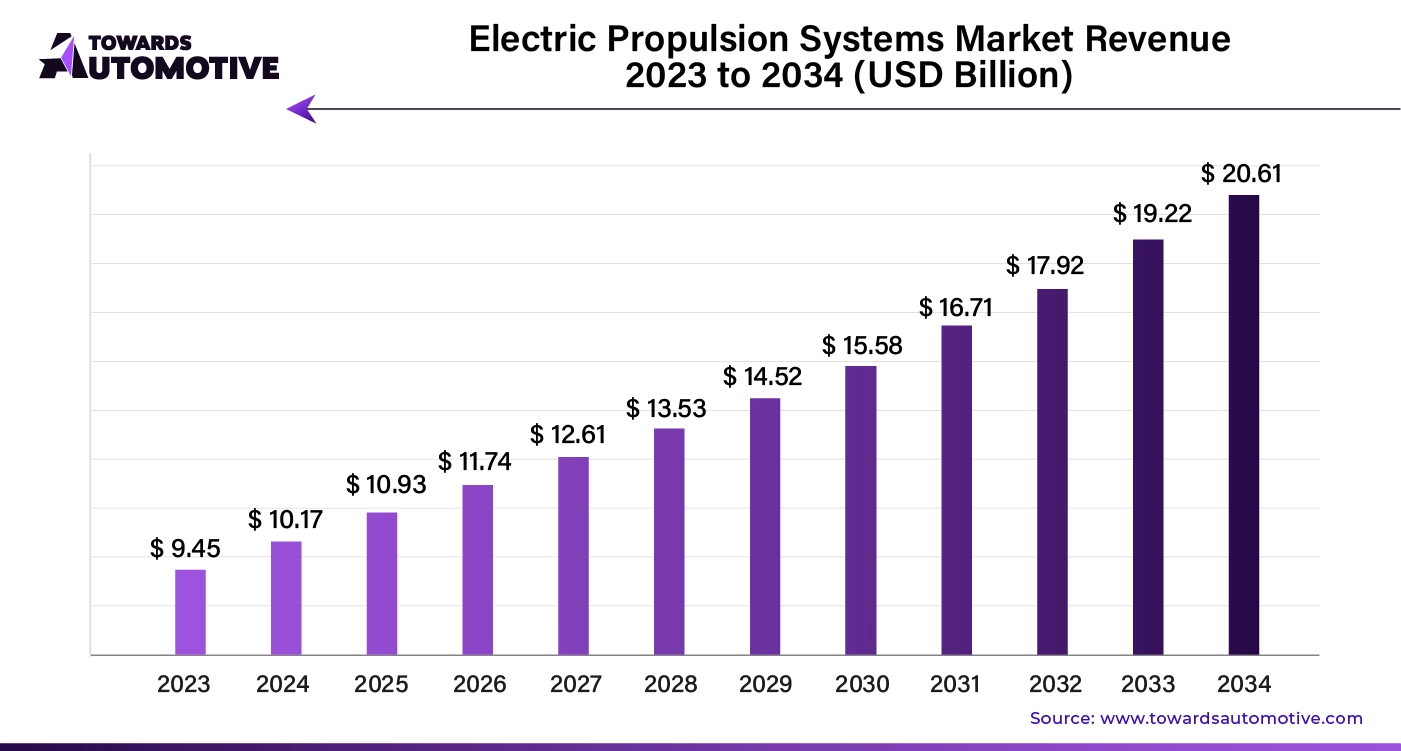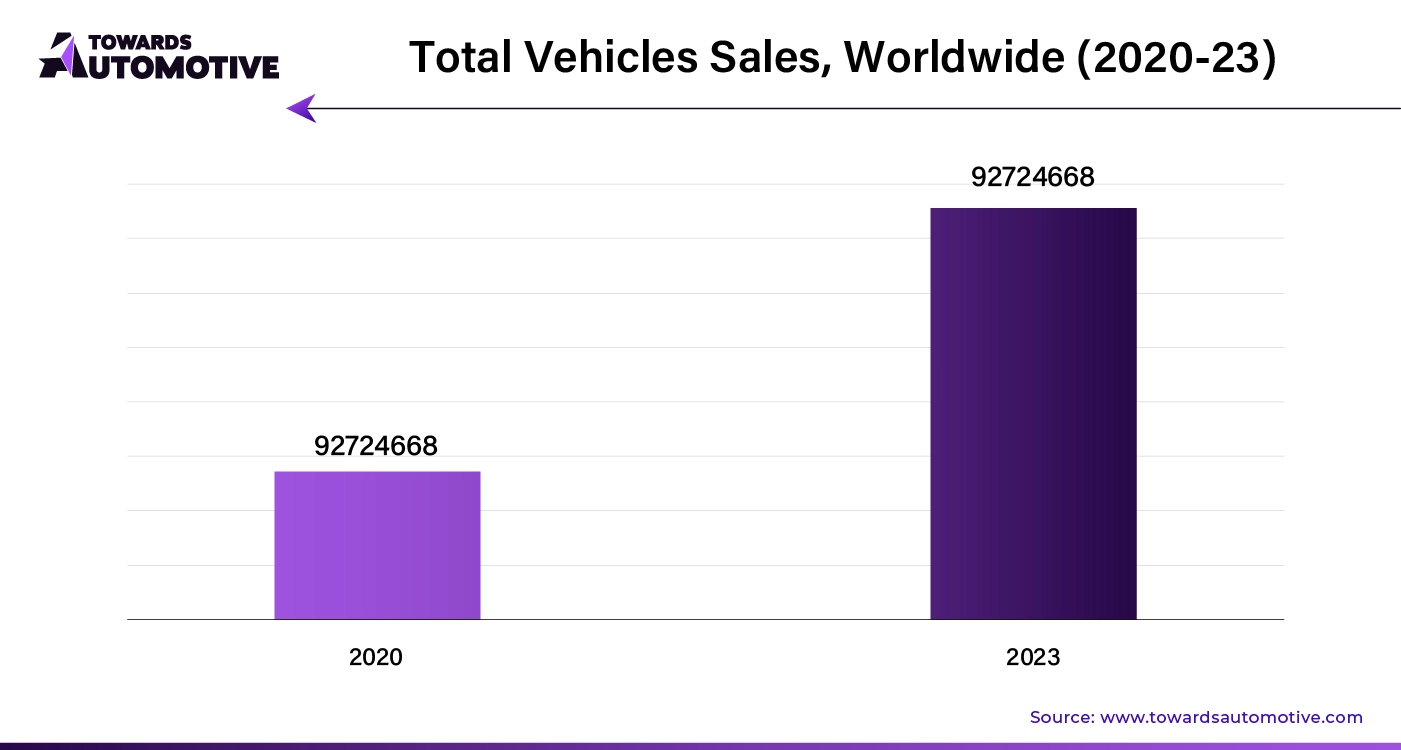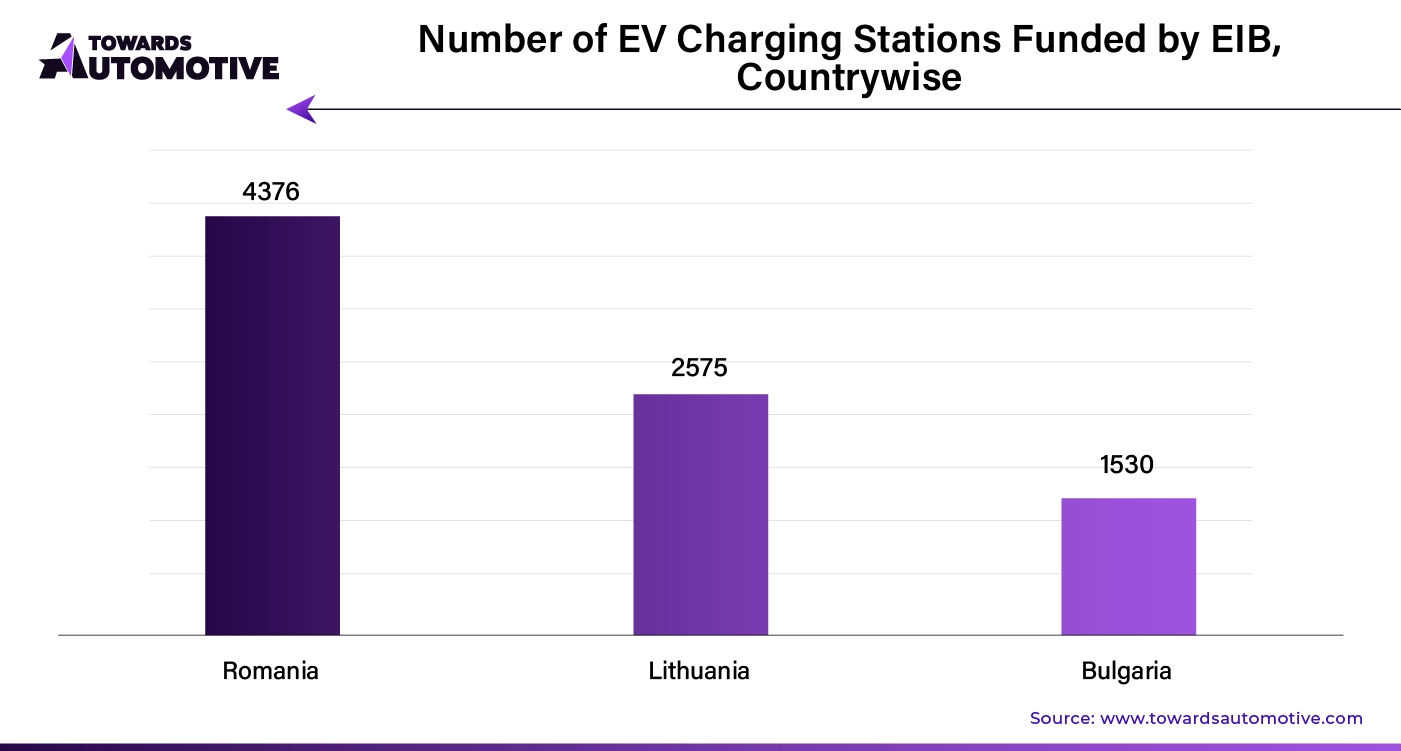April 2025
The global electric propulsion systems market size is calculated at USD 10.17 billion in 2024 and is expected to be worth USD 20.61 billion by 2034, expanding at a CAGR of 7.54 % from 2024 to 2034.

Unlock Infinite Advantages: Subscribe to Annual Membership
The electric propulsion systems market is rapidly evolving as a crucial component of the global shift towards sustainable and energy-efficient transportation. Electric propulsion systems, which encompass a range of technologies including electric motors, batteries, and power electronics, are central to the development of electric vehicles (EVs), hybrid vehicles, and other advanced transportation solutions. As concerns about environmental impact and fossil fuel dependency grow, electric propulsion systems offer a viable alternative with their zero-emission capabilities and improved energy efficiency.
This market is driven by advancements in battery technology, which enhance vehicle range and performance, as well as innovations in motor design and power management. Additionally, supportive government policies and increasing investments in research and development are accelerating the adoption of electric propulsion systems across various transportation sectors. The expanding application of electric propulsion extends beyond automobiles to include marine and aerospace industries, reflecting its versatility and potential. As the world transitions towards cleaner energy solutions, the electric propulsion systems market is positioned for substantial growth, driven by technological progress, regulatory support, and a growing demand for sustainable transportation alternatives.
AI significantly influences the electric propulsion systems market by enhancing the efficiency, performance, and management of electric vehicles. Through advanced data analytics and machine learning algorithms, AI optimizes battery management by predicting and managing battery health and energy consumption, thereby extending battery life and improving performance. Predictive maintenance powered by AI helps identify potential issues before they escalate, reducing downtime and maintenance costs. AI also plays a crucial role in power management, adjusting energy distribution in real time to enhance vehicle range and efficiency. In vehicle control systems, AI enables smoother driving experiences by optimizing motor performance, braking, and acceleration. Additionally, AI enhances safety and convenience through advanced driver assistance systems (ADAS), such as adaptive cruise control and collision avoidance. In the design phase, AI accelerates development by optimizing design parameters and simulating performance. Furthermore, AI improves charging solutions by managing infrastructure, predicting peak demand, and integrating renewable energy sources. Overall, AI drives innovation and efficiency in electric propulsion systems, supporting the transition to sustainable transportation technologies.
The rising sales of automobiles are a significant driver of growth in the electric propulsion systems market, reflecting a broader shift towards sustainable transportation solutions. As global demand for vehicles continues to increase, there is a growing emphasis on adopting electric propulsion technologies to meet environmental regulations and consumer preferences for greener options. The surge in automotive sales accelerates the need for electric propulsion systems as manufacturers and consumers alike seek to capitalize on the benefits of electric vehicles (EVs) and hybrid models. This heightened demand fosters innovation and investment in electric propulsion technologies, including advanced batteries, electric motors, and power management systems.
Increased vehicle sales drive economies of scale, reducing production costs and making electric propulsion systems more affordable and accessible. Additionally, as more automakers enter the market with electric and hybrid models, competition intensifies, leading to further advancements and improvements in electric propulsion technologies. The expansion of electric vehicle options also stimulates consumer interest and adoption, creating a positive feedback loop that propels market growth. As the automotive industry continues to evolve and embrace electric propulsion, the synergy between rising vehicle sales and advancements in electric propulsion systems will play a crucial role in shaping the future of sustainable transportation.

The electric propulsion systems market faces several restraints, including high initial costs and limited charging infrastructure. The upfront expense of electric propulsion components, such as advanced batteries and electric motors, can be a barrier to widespread adoption. Additionally, inadequate charging infrastructure in certain regions limits the practicality and convenience of electric vehicles, affecting market growth. Technological challenges related to battery performance, such as range limitations and long charging times, also pose hurdles in this industry.
The emergence of Vehicle-to-Grid (V2G) technology creates significant opportunities in the Electric Propulsion Systems Market by transforming the way electric vehicles (EVs) interact with the power grid. V2G technology allows EVs to not only draw energy from the grid for charging but also to return stored energy back to the grid when needed. This bi-directional energy flow can help balance supply and demand, support grid stability, and integrate renewable energy sources more effectively. For electric propulsion systems, V2G offers the potential for enhanced energy management and increased utilization of battery storage, which can lead to more efficient use of resources and reduced energy costs. Additionally, V2G technology can create new revenue streams for EV owners, who can earn compensation for supplying power to the grid. This innovation also drives the development of advanced battery management systems and smart grid technologies, further accelerating the growth of the electric propulsion market. By enabling more dynamic interactions between EVs and the power grid, V2G technology supports a more sustainable energy ecosystem and enhances the value proposition of electric vehicles.
The full electric segment held the largest share of the market. The fully electric segment is a major driver of growth in the Electric Propulsion Systems Market, significantly influencing the development and adoption of advanced propulsion technologies. As the demand for zero-emission vehicles intensifies, fully electric vehicles (EVs) are at the forefront of this transition, driving substantial investments in electric propulsion systems. The focus on fully electric vehicles accelerates advancements in key components such as high-capacity batteries, electric motors, and power electronics, as manufacturers strive to improve range, performance, and efficiency. This segment fosters innovation in battery technology, leading to enhancements in energy density, charging speed, and overall vehicle performance. Additionally, the expansion of charging infrastructure and improvements in vehicle-to-grid (V2G) capabilities are driven by the growth of fully electric vehicles, further supporting the electric propulsion market. The increasing consumer preference for sustainable and eco-friendly transportation options boosts the demand for fully electric vehicles, creating a positive feedback loop that drives market expansion. As automakers commit to electrifying their fleets and governments implement stricter emission regulations, the fully electric segment continues to play a pivotal role in advancing the electric propulsion systems market and shaping the future of transportation.
The aerospace segment led the market. The aerospace segment is a significant driver of growth in the Electric Propulsion Systems Market, as it spearheads the adoption of innovative propulsion technologies in aviation. With increasing environmental concerns and the push for sustainable transportation, the aerospace industry is exploring electric propulsion as a viable solution for reducing carbon emissions and operational costs. Advances in electric propulsion systems for aircraft are fostering the development of more efficient, quieter, and eco-friendly aviation solutions. This segment drives investments in high-performance electric motors, lightweight materials, and advanced battery technologies specifically tailored for aerospace applications.
The pursuit of electric and hybrid-electric aircraft also accelerates research into novel power management systems and energy storage solutions. Additionally, the aerospace sector's focus on improving the efficiency of short-haul flights and urban air mobility solutions further stimulates the demand for electric propulsion systems. As regulatory bodies impose stricter emission standards and the industry embraces greener technologies, the aerospace segment contributes to significant advancements and expansion within the electric propulsion market. This synergy between aerospace innovations and electric propulsion technologies not only supports the growth of the market but also paves the way for a more sustainable future in aviation.
Europe dominated the electric propulsion systems market. In Europe, the growth of the Electric Propulsion Systems Market is significantly driven by government incentives and support, investment in charging infrastructure, and initiatives to support urban mobility solutions. European governments are at the forefront of promoting sustainable transportation through a range of incentives and financial support programs. These include grants, subsidies, and tax incentives designed to make electric vehicles (EVs) and other electric propulsion technologies more affordable and attractive to consumers and businesses. By reducing the financial burden associated with electric vehicles, these policies stimulate demand and encourage wider adoption of electric propulsion systems.
Investment in charging infrastructure is another crucial factor driving market growth. The expansion and enhancement of charging networks across Europe address one of the primary barriers to EV adoption—charging accessibility. Governments and private entities are investing heavily in developing a comprehensive network of public and private charging stations, including fast chargers and wireless charging solutions. This infrastructure development not only makes it easier for users to charge their vehicles but also enhances the overall feasibility and convenience of electric transportation.
Support for urban mobility solutions further propels the growth of the electric propulsion market. European cities are increasingly turning to electric buses, scooters, bicycles, and other urban transport modes to tackle issues like traffic congestion and air pollution. By integrating electric propulsion systems into public transportation and urban mobility solutions, cities are promoting cleaner, more efficient alternatives to traditional fossil-fuel-powered vehicles. This shift not only helps to reduce emissions but also creates a positive feedback loop, where increased use of electric propulsion technologies drives further innovation and investment.

North America is expected to grow with a significant CAGR during the forecast period. In North America, the growth of the Electric Propulsion Systems Market is significantly fueled by rising environmental concerns, advancements in the aerospace sector, a developed automotive industry, and robust support for research and development. Growing awareness of environmental issues and the urgent need to address climate change have led to increased consumer and regulatory pressure for cleaner transportation solutions. This shift towards sustainability drives demand for electric propulsion systems, as they offer eco-friendly alternative to traditional fossil-fuel-powered vehicles.
Aerospace companies are also playing a pivotal role in this growth. The aerospace industry’s push towards electric and hybrid-electric propulsion systems for aircraft aligns with broader environmental goals and technological advancements. These companies are investing in research and development to create efficient, high-performance electric propulsion solutions, which not only advance aviation technology but also contribute to the overall growth of the market.
The developed automotive industry in North America is another key driver. Major automakers are transitioning to electric and hybrid models as part of their broader strategy to meet stringent emissions regulations and capitalize on evolving consumer preferences. This shift encourages the widespread adoption of electric propulsion technologies and fosters innovation in battery systems, electric motors, and power electronics.
Moreover, strong support for research and development from both public and private sectors accelerates technological advancements in electric propulsion systems. Funding and collaboration between automotive manufacturers, aerospace companies, and research institutions drive innovation and improve the performance, efficiency, and affordability of electric propulsion technologies. Collectively, these factors create a dynamic environment for the growth of the Electric Propulsion Systems Market in North America, supporting the region’s commitment to sustainability and technological progress.
By Component
By Application
By Propulsion
By Region
April 2025
April 2025
April 2025
April 2025
Dr. Arjun Patel is a distinguished expert in the automotive industry, holding advanced degrees in Automotive Engineering and Mechanical Engineering. His expertise spans automotive market dynamics, technological advancements, and sustainable practices. Dr. Patel excels in conducting in depth research and analysis on market trends, consumer preferences, and the economic implications within the automotive sector. He is renowned for his insightful publications on topics such as electric vehicles, autonomous driving technologies, and the evolution of sustainable transportation solutions. Dr. Patels research contributions have significantly advanced understanding in the field, earning him recognition as a leading authority in automotive research and analysis.
We offer automotive expertise for market projections and customizable research, adaptable to diverse strategic approaches.
Contact Us